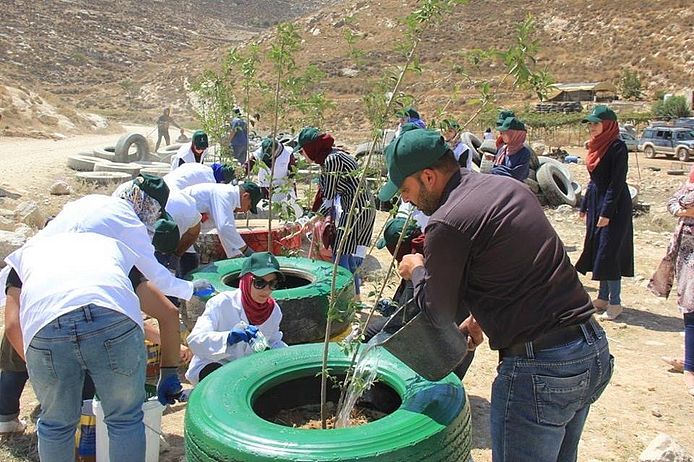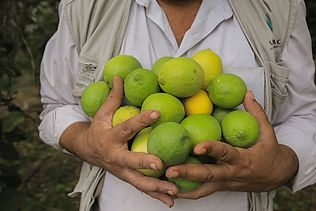An oppressive summer heat hangs over Ramallah as we get into the car to drive to the south of Nablus with our partners from the farmers’ organisation, Union of Agricultural Work Committees (UAWC). Founded in the 1980s, the UAWC advocates for the rights of Palestinian farming and pastoral communities and is a long-standing medico partner organisation. So far we have had no joint projects with UAWC in the Nablus region. However, our journey there today is to show our solidarity with the local communities. In recent weeks, there have been several cases of settlers burning olive groves and fields of Palestinian farmers in acts of arson. We learned about the incidents from the Israeli journalist Amira Hass, who has been living in the West Bank for more than ten years and has been associated with the medico office in Ramallah for just as long.
About an hour later we are in the small village of Jalud – situated between Ramallah and Nablus – surrounded by burnt fields that stretch over the slopes and offer a picture of destruction. Mahmoud Fawzi stands on the charred soil of his fields, a pervasive stench of smoke hangs in the air. The young man stands amidst the rubble of his existence that literally went up in flames. For almost 20 years his land has continuously lost money due to the routine vandalism of the Israeli settlers. This time it is particularly bad – more than 90% of his trees were burned.
Nevertheless, he tries hard not to show his despair to us, his guests. Over watermelon and tea, Mahmoud and his brother recount the incident. "A few days ago, masked men from the nearby settlements came into the village and set fire to the fields. Several hundred olive trees were burned; many of which were more than 70 years old. Since the last attacks in 2013 we have had cameras at the school building, which lies on the outskirts of the village. The cameras caught everything; even where they came from.” According to Mahmoud, the footage shows men wearing ski masks coming from the direction of the aforementioned settlement or outpost. The arsonists were systematic: within one night, most of the village's trees and some cereal fields went up in flames.
Institutionalised Impunity
In a country with a different legal system, the footage would probably have been treated as important evidence, despite the fact that the men’s faces were masked. In the West Bank however, the farmers are not citizens of a state that grants them full rights. As residents of an area that has been occupied for more than 50 years, they are subject to Israeli military jurisdiction. In contrast the settlers, as Israeli citizens, are served by the Israeli police – even in the occupied territories. In order to file a complaint against settlers, Palestinian farmers would have to go to a settlement to visit a local police station.
These seemingly Kafkaesque conditions create a reality in which perpetrators of settler violence are almost never brought to justice and this is reflected in statistics from established human rights organisations. From 2005 to 2017, the Israeli organisation Yesh Din evaluated more than 1,200 cases in which Palestinians reported settlers for physical violence or robbery and damage to their property.2 Ultimately, only 3% of these complaints resulted in a guilty verdict.
The institutionalised system of impunity for Israeli citizens in the occupied territories means that, despite continual and large-scale attacks on farmers and shepherds, fewer and fewer complaints are being filed.
In this respect, it is not surprising that Mahmoud and his brother also have little hope of justice in court. Resigned, Mahmoud points in the direction of the outpost Adei-Ad: "They are trying to destroy us and they do so with impunity. It’s not enough that they have illegally built their settlement and occupied fields on Palestinian property. They are trying to take more and more land. We are just a disturbance that should disappear and no matter what happens here, it's not a big topic for the international community anymore. In some settlements they even rent rooms on Airbnb. What kind of people make holiday on stolen land?"
The problem of settler violence in Jalud and other villages in the West Bank should not be seen as a few fundamentalist hardliners acting in isolation. It is part of a broader systemic problem, because the settlement project aligns with wider state interests, as reflected by Benjamin Netanyahu’s plan to annex the Jordan Valley.
Land control and access to resources in order to cultivate this land is a key aspect of the asymmetric conflict in the Occupied Territories – where the local population is almost powerless against the Israeli military and the settlers it supports.
"To be Independent from the Occupying Forces Once Again"
Back in Ramallah, we sit in the office of UAWC and discuss ways of assisting the farmers and shepherds in the Nablus area, who regularly suffer arson and violent attacks by settlers. We will try to raise funds to help families in the communities replant from 2020 onwards. At the same time, however, it is clear that those affected cannot wait three years – the time it takes for saplings to produce their first harvest. Consequently, we decide to start intercropping in autumn – a practice where certain cereals and vegetables are grown between the trees. In this way, the soil is rehabilitated but at the same time still contributes to the farmer’s livelihood. In October, farmers will be provided with seeds from the UAWC’s seed bank in Hebron, which only cultivates local, pesticide free seeds.
In addition to the practical steps that have to be taken, we also talk about the socio-economic conditions in which the violence takes place. More than 50 years of military occupation has seen the economy in the West Bank develop into a captive market. Since the beginning of the occupation in 1967, all Palestinian economic activities have been placed under the control of the Israeli military administration, and since this time all economic activity has required their approval. In addition, all Palestinian imports and exports must go through Israeli-controlled borders. Due to the amount of Israeli companies serving as necessary intermediaries in each transaction, the already small profits of local companies are yet more reduced. The Paris Protocol, signed as part of the Oslo Accords in the mid 1990s, further codified the de facto dependence of the Palestinian economy. Access to the markets is only unilaterally de-regulated. While Israeli goods flood shelves in Palestinian stores, Palestinian products are barely to be found in Israeli supermarkets.
However, one of the project co-ordinators of UAWC, Moayyad Bsharat, draws attention to another reality of Palestinian everyday life: Decades of occupation mean that not only is every part of the economy controlled, but that, significantly, the mentality in parts of our society has been shaped by it. For many of the new elites transformed by the neo-liberalisation of the Occupied Territories under the Oslo system, Israeli products have become a status symbol. Palestinian farmers suffer not only from distorted competition, but also because their goods are perceived by a certain section of the middle and upper classes as inferior in comparison. "As well as the new elites, who are buying Israeli vegetables or dairy products to fit a certain image, there are those who choose cheaper Israeli produce due to financial hardship or out of simple indifference. After 70 years of displacement and oppression, a tendency towards apathy and de-politicisation in Palestinian society is felt to a large extent."
The UAWC seeks to change this, and raise social awareness of the importance and potentials of consumer choice, through their educational work in schools and communities. Their message is that strengthening the modest but ever growing market for local, organic cooperatives and businesses do not just support Palestinian agriculture – they also contribute to Palestinian independence from the occupation.
This view is reflected in the awareness of the younger generation of Palestinian activists, who increasingly view agriculture as part of civil society resistance.
Yara, who works in organic agriculture as part of the Om Soleiman Farm collective in the village of Bil'in, describes the situation in this way: "The sad truth is that more than half a century of colonisation and occupation has left us completely dependent on Israel. Right now, we would not be able to be free tomorrow. To be independent, to be able to feed ourselves, is therefore, of central importance both economically, but also psychologically."


